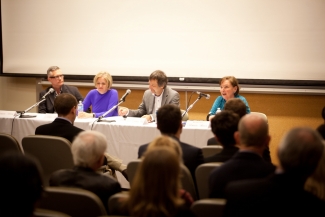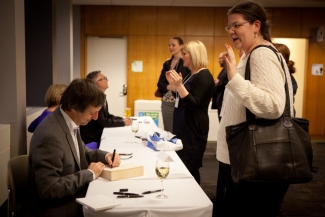Alumni panel featured authors Guy Gavriel Kay, ’78, Andrew Pyper, ’95 and Kate Hilton, ’99
By Sandra Bartlett

Guy Gavriel Kay, Kate Hilton, Andrew Pyper
It turns out that a University of Toronto law degree is good training for writing fiction.
A panel of three former lawyers, now published authors, talked about the journey from legal texts to novels at this Faculty of Law event, April 29th.
Outgoing Dean Mayo Moran opened the evening. “When I welcome new students to U of T law school I always tell them they can do absolutely anything with a U of T law degree.”
“For me this is especially moving because this is the last official thing I am really doing as dean,” said Moran. “I am just so happy to close it off this way with three wonderful novelists and a fantastic judge, all U of T law alumni.”
Authors Guy Gavriel Kay, ’78, Andrew Pyper, ’95 and Kate Hilton, ’99, got a gentle grilling about deserting the law profession by fellow alumna Justice Rosalie Abella, ’70. She began by asking each of them why they went to law school.
After reading Clarence Darrow as a child, Guy Gavriel Kay said he always knew he would become a lawyer. But after completing an undergraduate degree at the University of Manitoba in 1974, he was asked to go to Oxford to help Christopher Tolkien edit his father, J.R.R. Tolkien’s unpublished book, Simarillion.
While at Oxford, Kay fell in love with writing, but describes his decision to go to law school as “prairie pragmatism.”
I remember being in law school and having the sensation that my brain was being rewired. -- Kate Hilton
“You go to law school if you grow up on the prairies in Canada and you think: how many people do I know that make a living writing books? And then you realize you don’t know any.”
It was while Kay was articling with Eddie Greenspan, ’68, that he got his chance to blend law and writing. He was hired to work on the CBC radio series, The Scales of Justice. The series, created by Greenspan and author George Jonas, recreated prominent Canadian legal cases. That eight-month-a-year job, Kay said, gave him the money and the time to write his first novels.
For Kate Hilton, law school promised a career that would give her financial independence. Law wasn’t a passion but the decision to take the LSAT was made after deciding she needed to get serious about her life, she said. “I thought, you know, how bad could this be? In fact I surprised myself by loving law school.”
“I thought, you know, how bad could this be? In fact I surprised myself by loving law school.”
Andrew Pyper said it was a passion for law and a passion for words that led him to law school. And he married the two in his first novel, Lost Girls, by making the narrator a young defense lawyer.
“I knew very early on that I enjoyed law school the way one enjoys a camping trip, knowing that [afterwards] I would go home [to writing].”
Justice Abella took that opening to ask how law had influenced their writing.
“I remember being in law school and having the sensation that my brain was being rewired,” Hilton said.
She thinks that ‘rewiring’ now forces her to pay attention to details.
“I never let myself get away with bad arguments. I am always very insistent that my writing makes sense to me and I don’t cut myself a lot of slack. I think that’s the lawyer,” Hilton said.
Kay said studying law has deeply influenced his writing. He pointed out that writers like lawyers have to become instant experts on subjects in a short period of time.
“You need to be able to cross examine someone who has spent their life analyzing tire skid marks and road surface and weather conditions to determine how fast someone was going when an accident occurred,” Kay said. “And you have to get up on that other person’s ground to challenge a case or make a case.”
Kay said he became an instant expert on China in the 12th dynasty for his most recent novel, River of Stars. A study of southern European culture, including the early Byzantine Empire was part of the process in writing his first books, the Fionavar Tapestry Trilogy.
That research, and revising what he’s written, is the best part of the process for Kay, while for Pyper the writing is fun. He drew a round of laughter when he described writing as “the second greatest pleasure I know but occasionally hard to get going, just like the first pleasure.”
 But when asked by an audience member about ‘writer’s block,’ Pyper said writing is work just like any other.
But when asked by an audience member about ‘writer’s block,’ Pyper said writing is work just like any other.
“If you went to the doctor complaining of writer’s block, there is no MRI. ‘Oh, there it is, we gotta get that out of there’,” Pyper said. “Or if you didn’t go to work for a week, returned the next week and they said, ‘Where the hell were you? Well I had ‘work block’.’ It probably wouldn’t fly.”
Hilton wrote her recently published novel, The Hole in the Middle, in three-hour sessions one day a week, while working and raising two children. When she couldn’t find a publisher, she sold the book online. It had thousands of downloads in the first month, attracting the attention of an agent who sold it to HarperCollins.
Hilton said there are clearly two kinds of writers: those who think you should suffer for your art and those who don’t like to suffer very much.
“I am in the second category. If I didn’t like it, I wouldn’t do it because frankly it is not that financially lucrative. You do it because you love it.”
Photos: Michelle Yee


 “I thought, you know, how bad could this be? In fact I surprised myself by loving law school.”
“I thought, you know, how bad could this be? In fact I surprised myself by loving law school.” But when asked by an audience member about ‘writer’s block,’ Pyper said writing is work just like any other.
But when asked by an audience member about ‘writer’s block,’ Pyper said writing is work just like any other.